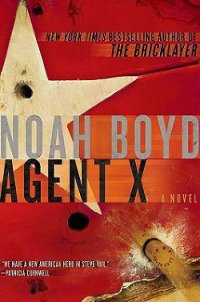The Bricklayer - Boyd Noah (читать хорошую книгу полностью .txt) 📗
“He’s a pain in the ass.”
“Beyond that. They used to say he bit off his nose to spite his face so many times that he actually learned to like the taste.”
“Then why was he fired? Apparently it wasn’t for a lack of courage.”
“He hated—no, that isn’t right—he simply didn’t recognize authority, at least not incompetent authority. That’s what was so strange about his firing. He could have prevented it by giving up a thoroughly disliked assistant special agent in charge. It all started when a Detroit police officer was shot and killed in the line of duty. They didn’t have any idea who had done it. Vail always had great informants, so he goes off on his own to contact them. At the same time, he’s poking around the murder investigation, developing new sources. He finds this one local who, after a little, let’s say, cajoling, names the shooter and also tells Vail that the gun used is at the killer’s residence. Which was kind of a feat in itself because it turns out the informant was the killer’s cousin. At the same time, because killing a police officer is a federal offense, the Bureau offers a twenty-five-thousand-dollar reward. Even though he would not have given up his cousin without Vail getting it out of him first, the informant decides that he might as well cash in and calls the same information into the FBI tip line. One of the ASACs at the time was Kent Wilson. Do you know him?”
“By reputation.”
“Then you won’t have any trouble believing what comes next. With the tip, Wilson has the same information as Vail—because of Vail’s work on the street. Vail was always that guy you called when you needed to get something done in spite of the rules. All full of himself, Wilson has Vail come in and reads him the tip sheet. Then tells him to do whatever is necessary to get probable cause for a search warrant at the killer’s residence. Vail leaves without saying a word. He already had everything in motion.
“Because the informant had no track record, his credibility for a search warrant wouldn’t have been strong enough, so Vail calls one of his most documented sources and has him listen while he telephones the cousin and has him repeat the information. Then Vail has his old informant repeat it to him for probable cause on the search warrant. The Detroit police find the gun, get a confession and eventually a conviction.
“Wilson tries to take credit for the arrest, but the brass at the Detroit PD goes nuts because Vail had also been keeping them up to speed all along, since it was their officer. He didn’t tell them about the sleight of hand with the sources. They call a press conference and give all the credit to Vail.
“The most amazing part is Wilson thinks it was all Vail’s doing and calls in the Office of Professional Responsibility, telling them that Vail falsified information to obtain a search warrant. He gives absolutely no thought about how it could come back and collapse on him. Subsequently, Vail refused to talk to OPR.
“Because of the inconsistencies in Wilson’s statement, they tell Vail what they suspected happened and even that Wilson had given him up. Still Vail won’t answer their questions. Not even after they offered him a walk if he flipped on Wilson would he say anything. They even went to the trouble of tracking down Vail’s old informant and threatened him, even tried to bribe him, but he wouldn’t give up Vail.”
“That’s unbelievable. Why wouldn’t Vail just give Wilson up? He’s not exactly the kind of boss you’d waste loyalty on.”
Kate leaned back. “Vail’s not that easy to figure out, but there is one very practical reason. If he admitted manufacturing probable cause, OPR would have had to notify the state prosecutor’s office, and the search, confession, and conviction would have been thrown out.”
“So Vail let himself be fired so a cop killer wouldn’t walk.”
“I think it’s even more than that. I don’t know. He seems to have this resentment for the way the rest of us lack commitment or something. He didn’t even show up for his last OPR interview, therefore insubordination.”
“Too bad we lost him.”
Kate sat silently considering something before she said, “Sir, Vail had this reputation for finding people. He handled all the federal fugitive warrants for Detroit homicide. They said whether someone was gone fifteen minutes or fifteen years, he’d find them. Like I told you, he wasn’t on my squad, but everyone knew about Steve Vail. Funny thing was he seemed oblivious to any kind of notoriety, that anyone would be interested in anything he did. I always thought it was an act—until just now watching him sneak out of that bank.”
“Are you suggesting we bring him into this?”
Kaulcrick said, “I don’t think that’s a good idea. We’ve got more than enough resources at our disposal. You can’t bring a civilian into this. With each turn of this thing, it looks like we can’t protect ourselves from ourselves.”
“Just to find Bertok,” she said. “Someone who doesn’t have to tiptoe around like the rest of us. So far we’ve got nothing. It’s pretty obvious that Vail can keep his mouth shut. What have we got to lose?”
The director pushed the Play button and watched again as Vail disarmed the two bank robbers. “Think you can get him, Kate?”
“Me? He despises men in authority. What do you think his reaction will be to a woman?”
“I think you’d better find out.”
FIVE
STEVE VAIL SPLASHED SOME WATER ONTO THE MORTAR AND USED knife edge to sink the moisture deep into the mixture. The late-morning sun felt good on the back of his neck. It had rained the night before, leaving one of those damp Chicago mornings that felt cooler than the mid-seventy-degree temperature. Moving back into the shadow of the large circular chimney he had been hired to rebuild, he picked up a brick and flipped it over so its wire-cut face was in position and buttered one end with the softened mortar. He pushed it into place, tapping the top with the butt of the trowel handle, and then used a backhand sweep to scrape off the excess mortar, flicking it into the joint just formed. His eye checked the brick’s alignment as he reached for the next one.
The ladder he had used to get to the flat roof started tapping rhythmically against the top of the wall. Someone was coming up. Flicking the excess mortar off the trowel, he threw it, sticking it into the pine mortarboard. He peered over the edge of the roof and was surprised to see a woman coming up the ladder. She moved quickly, her hands and feet finding the rungs instinctively. She was wearing a pantsuit and small heels, which should have made the climb more difficult, but they didn’t seem to slow her at all. Under her jacket, on the outside of her hip, he could see the bulge of a gun. Parked behind his truck now was a four-door sedan, one of those full-size government cars that were conspicuously nondescript.
Kate Bannon came over the top of the ladder and was surprised to find Vail leaning against the chimney, apparently waiting for her, his stare mildly curious. She brushed her hands against each other, wiping away imaginary debris from the ladder as she composed herself. “Hi,” she said, extending her hand. “I’m—”
“Kate Bannon.” He took her hand.
“How’d you know?”
“Detroit.”
“I didn’t think you’d remember me,” she said. “To tell you the truth, I didn’t think you knew I existed.”
“I knew.” His mouth tightened into a grin that she couldn’t quite decipher.
“Even though I was some ‘management bimbo’ getting my ticket punched?”
He smiled more completely. “Even though.”
“I would assume that’s what most of the male street agents thought,” she said. “And looking back, I’m not sure they were wrong.”
“Brutal honesty, and so early in this little—what is it we’re having, some sort of sales pitch?”
“At least give me the courtesy of pretending you’re being fooled,” she said. “And it’s not about your performance at the bank last month if that’s what you’re worried about.”




